#its not just an adaptation filled with an important message it is visually and emotionally STUNNING
Text
all quiet on the western front is literally a movie discussing the futility of war, of how little boys sign up to march to their death because of propaganda fed to them by their teachers and mentors who prey on their idealistic view on life. it is a film that makes you watch death after death after death, without giving you a single cause or philosophy or ideal for you to soothe yourself with—because there is none. there are only boys and men, bleeding cold and alone on the dirt and mud. there is no worth. there is no reason. there is only death.
and you reduce it to a "war movie". it's based off a book brave enough to depict the realities of war in the charged political climate of 1929, and you call it "the war movie".
#all quiet on the western front#oscars 2023#i hope it wins best picture because it DESERVES best picture. and all of the awards its been given tonight#text#im fucking PISSED#its not just an adaptation filled with an important message it is visually and emotionally STUNNING#its a beautiful & haunting movie to watch — its filmed beautifully and i dont know camerawork#but all the shots where you can practically feel the camera tumble in the dirt with the characters.........#the way it frames paul's face during the last charge............. its all beautiful
955 notes
·
View notes
Text
OPINION: How Umineko Changed My Entire Approach to Fictional Media

All screenshots captured on Playstation 3 by author
The following article contains a discussion of thematic elements and motives that appear during the second half of Umineko When They Cry. While no actual plot details will be revealed, some might still consider it spoilery. So if you want to experience one of the greatest pieces of fiction ever completely untainted, you should check it out on Steam right now.
The internet is pretty rad, isn't it? You can follow your favorite creators, watch tons of awesome shows, and talk about your favorite things with other people. How about we do that right now? Well, too bad, because YOUR FAVORITE THING IS BAD, ACTUALLY! You made the mistake of posting about it online, so prepare to be sent lots of negative comments linking to 5-hour video essays pointing out every single flaw about your favorite story and why you are wrong for enjoying it!
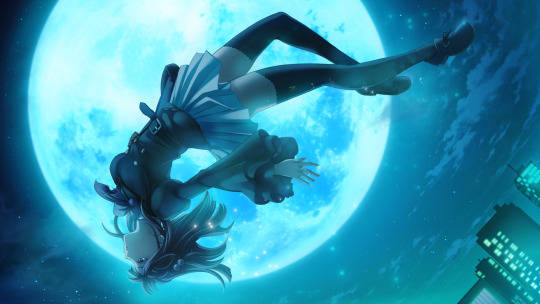
It's a situation I'm sure many of us have experienced at least a couple of times online. While the internet can be fantastic for finding like-minded people to chat with about things you deeply love, it can also be a gamble and sometimes you end up in a discussion where your conversational partner seems more interested in showing off their intellectual superiority over a work instead of openly discussing its merits or flaws. I certainly know — I used to be one of them.
"As I've eaten my way through countless tales to escape boredom, I haven't really been eating them. I've just been killing them." - Hachijo Tohya
The rise of social media has opened the gates for some incredible in-depth discussion and has changed the way I experience things over the years. But there is also a dark side to the discussions on the internet and that is the trap of wanting to feel intelligent in how you approach stories, which is often accompanied by not really being emotionally earnest. I myself tried to come off as perceptive by pointing out so many mistakes and bad things about media which led to exactly one thing: me becoming absolutely miserable. All I cared about was consuming as many things as possible (FOMO's also one of the many downsides of social media) and appearing as "smart" about them as I could. Until one fateful 10-month stretch in which I played a certain visual novel known as Umineko When They Cry.

Umineko really is tailor-made for catching people with that mindset: It depicts a mystery story about how mystery stories are told and consumed — and what genre would be more fitting to challenge someone concerned with intellectual superiority than one that is all about the clash of Author vs Reader?
"Books aren't a competition. It's not about who's read the most. But boasting that you've read all your ever need to read is just as wrong-headed" - Battler Ushiromiya
Umineko starts off with a well-known mystery trope: A family meets up in a mansion on a distant island, gets cut off by a storm, and then slowly gets murdered one after the other until everyone is dead. And just as in Agatha Christie's And Then There Were None (which served as one of Umineko's main inspirations), a bottle detailing the events of the incident to the public eventually washes ashore. But this only serves as Umineko's prologue, as its main character Battler quickly finds himself facing off against a self-proclaimed Golden Witch known as Beatrice on a meta-narrative level where he must prove these gruesome killings could have been committed by a human culprit, or be forced to acknowledge her existence and allow her to fully revive.
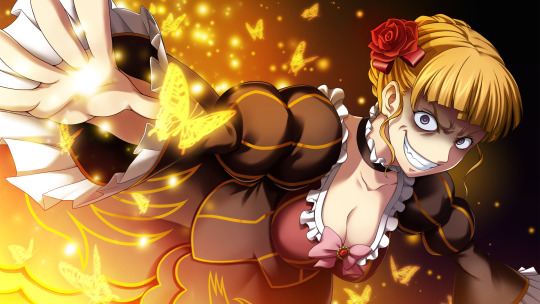
Thus begins a game of chess filled with exceedingly preposterous murders in which our protagonist's family gets killed by demons, giant goat butlers, and sharpshooting bunny girls — all supplemented by the so-called Red Truth, a truth-revealing tell not unlike Martha's vomiting in Knives Out. Battler must use these authorial proclamations and find a loophole that enables him to explain the murders in a way that does not frame any of his beloved family members as the killer and still allows him to deny the existence of the gruesome and torturous witch.

Umineko's all about how stories are perceived and told by both their creator and their audience. It explores how remarks by the author in every situation — no matter how off-hand they might be — can be used, applied, and twisted to shed a completely different light on a story regardless of its original intent. It shows how adding meaning to a narrative that wasn't meant to be there can both add to or subtract from its most important element: The heart its creator wanted to convey.
"If I had found meaning in only exposing the truth, I would have sunk to the level of a truth-revealing witch and fallen into ruin, spreading only hatred, [...], crushing and refusing to acknowledge anything but the particular truth I seek, unable to escape the cycle of misery." - Ange Ushiromiya
Umineko goes through many different angles of how we create, share, and discuss the tales that fuel our discourse. It ponders the importance of rules when creating storylines and tackles how easy it is to overlook major themes and motives by just focussing on minute details that are open to misinterpretation and irrelevant to a story's soul. It even includes the typical misanthropic yet oh so intelligent detective that usually gets idolized in most media (think BBC's Sherlock or House, M.D.) and puts them at odds with every other character because who would really want to cooperate with someone that completely disregards you as an equal human being and merely perceives you as an amalgation of hints, motives and alibis?
"Sheesh! Just one more step and I'd have been able to take a heart as innocent as the smooth sand just after a wave had pulled back and tear it to bits. What a shame. This isn't fun anymore." - Erika Furudo
And just when you start to really get into Umineko, it moves away from its main conflict, providing you important hints for its solution which most readers ignore as they aren't presented with facts and logic but on an emotional level distanced from the characters we long to get back to. But most importantly, it conveys how one single element is so indispensable to enjoying the narrative odysseys we embark on in our lives, to cherishing the characters that are presented to us in these tales, and to truly understand a story's message behind things like story developments, plot twists, and narrative tricks. I, of course, am talking about love.
Be it the love you feel for characters, for certain staging elements, phrasings of prose, orchestrations of music, design of sound effects, implementations of themes and motives, or cinematographic puzzle pieces — the one thing that is indispensable to truly enjoy all kinds of media, is love. Or, to quote Umineko directly, "Without love, it cannot be seen."
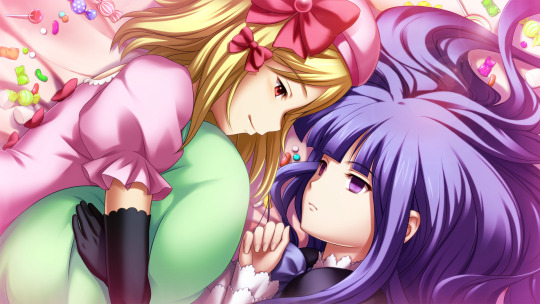
By the time, I was nearing the end of Umineko's eight main chapters, it had transformed from an intellectual battle between author and reader to an all-out war of a story against its community of readers who simply wanted to tear it down to cold, hard "facts." I had spent ten months and over 100 hours. The first half took eight of those months to get through (owing to a few lengths in Episodes 2 and 4), I finished the second half in less than two despite my busy schedule. I even dedicated a whole 15-hour marathon to the final episode as I was too glued to the grand finale to move away from it.
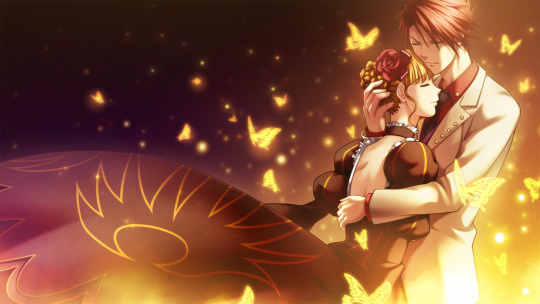
A new me came out the end. I no longer had an interest in tearing apart media for minor missteps. I enjoyed them much more deeply and honestly and began taking my time with the things I consumed. Instead of filling my plate at the buffet of stories as much as I could, I gave each dish its own course on the menu so I could appreciate its flavor in a different way — one bite at a time and not stuffed up simply to give the outward appearance of a seasoned gourmet. And for that, I will never be able to thank Ryukishi07 and his co-creators at 07thExpansion enough.
"The point of theory-making is not to create a culprit or to trample the truths that lie in the hearts of those who have not sinned. If you want to play detective, don't neglect the heart. Otherwise, we're just intellectual rapists. Don't forget it!!" - Willard H. Wright
If you are interested in reading Umineko When They Cry, you can find both its Question Arcs and its Answer Arcs on Steam, GOG, and MangaGamer. You can also read the manga adaptation digitally on Bookwalker (though I personally recommend the visual novel for its award-worthy soundtrack alone).
What work of fiction has touched your life in a profound way? Tell us in the comments!

René Kayser works for Crunchyroll as a PR and Social Media Manager in Germany. You can find him on Twitter @kayserlein where he tries to get people into Umineko every single day.
Do you love writing? Do you love anime? If you have an idea for a features story, pitch it to Crunchyroll Features!
19 notes
·
View notes
Text
Sandtion: The Sense and sensibility connection - a meta collab with @and-holly-goes-lightly
As some of you may have gathered, @and-holly-goes-lightly and I are salt mates (this is a tumblr term I have learned only recently and am planning to run into the ground. You have been forwarned. I don’t want any complaints down the line!)
It all started about a year ago, with this:
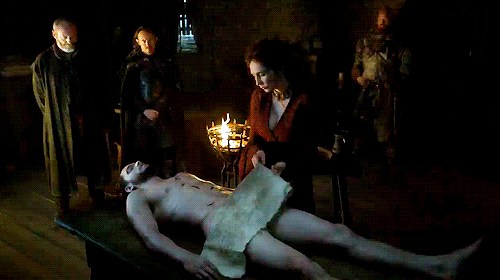
And progressed steadily until we ended up here:

Occasionally, between ogling pictures of naked men, we discuss serious issues as well. Those end up as metas for your consumption, most of the time.
It’s a colaboration that works well. I write long metas, she writes really good ones. We enjoy. We have fun.
Given that we both obssesively analyze tv content and that we tend to reach about the same conclusions, we have been planning on doing some project together for a while now.
I think if 2 months ago someone had told us that Sanditon would be the tv show that would see us join writing forces, we would have been more than a little shocked.
But here we are … hoplessly obssessed with Austen’s unfinished novel and ITV’s unfinished tv show (get the hint, ITV?!?! I hope you do. Chop, chop! You can’t live on Downton Abbey reruns for the rest of time, you know)
So on this most special of days, @and-holly-goes-lightly and I bring you the motherload of Sandtion metas. Two crazy writers, one tv show, one simple title:
Sandtion: The Sense and Sensibility connection
It’s no surprise to anyone, at this point, that Andrew Davies wears his Austen influences on his sleeve in Sanditon. You can find easter eggs for most of Austen’s work, from the famous Pride and Prejudice to the obscure Lady Susan.
However, Sense and Sensibility seems to be one work that hasn’t insipired much comparison from the fandom. And it’s perhaps for that reason that Sandion’s last two episodes were so hard to digest and why so many question marks were raised in regards to Charlotte’s characterization.
In this project we aim to dispel some of that confusion and attempt to put into prespective the character arcs of both Sidney and Charlotte in:
Sidlotte: A parallel journey between Sense and Sensibility by @fortunatelylori
As well as delve deeper into Charlotte’s POV through out the season finale in:
Charlotte Heywood - From Sensibility to Sense by @and-holly-goes-lightly
We hope you enjoy our take. Please don’t forget to leave us your comments in the reply section. This is a new format for us and we’d love to hear from you on how you like this kind of collaborative work.
Sidlotte: A parallel journey between Sense and Sensibility

As I was reading the now infamous Theo James interview, I was reminded of the “unusual” visual representation of Sanditon. It really does look quite different to most Austen adaptations which are defined by the sunny, sanitized domesticity of the English garden.
Sanditon doesn’t look like that. It’s rough and a little wild. It presents a world in the throes of change, with gales, nudity and darkness lurking around the corners. I think it’s those visual cues that made Theo link it to Wuthering Heights with its Yorkshire gloomy moors and harsh winds.
But that just goes to show you Mr. James has not done his proper Andrew Davies research (Tsk, tsk, me thinks he will need to do a few more nude scenes to atone for it) because the wind swept beaches, the wilderness of the English countryside, the cowboy motif? They all go back to this:

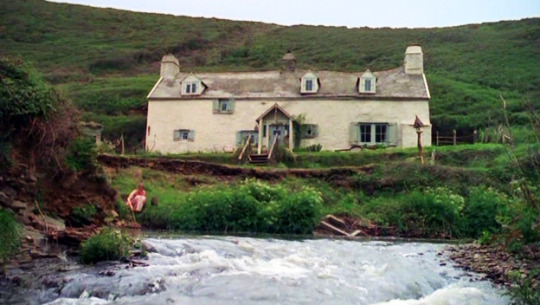


I imagine the visual style of Sense and Sensibility 2008 was in part generated by an attempt to separate it from the very famous 1995 version (the quintessential sunny English countryside film) and in part as a response to the earthier approach Joe Wright took for his now very influential version of Pride and Prejudice (2005).
But I do think Sanditon owes more to S&S 2008 than just its visuals. I’ve talked about this in the past but Sanditon, to me, is really Davies’ homage to Austen’s entire body of work so the more you dig and analyze, the more similarities and parallels you are going to find between Sanditon, its characters and the rest of the Austenverse (I really hope this is just a thing I say in a sarcastic way on tumblr. Not everything needs to be a –verse, people!).
Episode 8 really brought this theory into focus for me. In my review I said that the finale marked the tonal shift of the story from the naïve, hopeful and mostly comedic territory of Northanger Abbey and Pride and Prejudice towards the darker, more reflective tone of Persuasion and Sense and Sensibility.
Of course, comedy and witticisms are a core trait of all of Austen’s work. Her voice is so powerful that she is always an extra character in her own stories. However, Persuasion and S&S are also permeated with a sense of loss and angst that her other works don’t really have.
They’re more mature I suppose one could say. And it’s that maturity that plays a role in the shift that occurred in the season finale of Sanditon. Because Sanditon is really all about Charlotte Heywood. We enter this world with her and we follow her coming of age story throughout the season. And that story is marked by a pretty steep transition from the romantic, hopeful heroine represented by Marianne Dashwood to her restrained, sensible sister, Eleanor.
One of the things I liked the most about S&S 2008 was how much more balanced its view on Marianne and Eleanor was. In the 1995 film, it always felt as if Marianne was presented as a cautionary tale while Eleanor was the heroic nurturing woman who endures everything stoically and is rewarded for her restraint in the end.
But that’s not really, to my mind, the message Jane Austen would like us to get out of S&S. Just like with Pride and Prejudice, Austen is shining a light on the folly of both extreme sense and as well as extreme sensibility. It is not wise to jump head first into situations having only Lord Byron’s poems as your guide but it’s also equally unwise to constrain yourself to the point where you are unable to confide in anyone, to the point where you deny your feelings and end up a passive participant to your own life.
With Charlotte Heywood, we get to explore both those behavioral patterns.
The change from Marianne to Eleanor doesn’t occur in episode 8, by the way. It occurs at the end of episode 6 and carries through to the finale. That’s why people, including myself, were taken aback by Charlotte’s apparent change in demeanor in episode 7, from the girl who always spoke her mind (even when she shouldn’t) and wore her heart on her sleeve to the outwardly detached, apprehensive young woman who was waiting for the other shoe to drop even as the man she loved was about to propose to her.
It would be easy to blame this transition on poor execution and I do believe the shift was too sudden and it was a mistake to have it start off screen (in between episode 6 and episode 7). However, the arc itself is not a mistake and it’s actually very clever.
For one because it allows us to explore this story both from the naïve, romantic perspective as well as the angst filled one.
Secondly, and most importantly, because it works in tandem with Sidney’s arc, who is going through the exact opposite journey from the emotionally repressed outlier to the open hearted tormented hero, representative of the Byronic romantic ideal.
What was supposed to happen is that by the end of episode 8, Sidney and Charlotte would meet in the middle, she as a more controlled romantic, he as a warmhearted stoic. What Davies gave us instead is two ships that passed each other in the night and have, by their last scene in episode 8, completely exchanged places.
So I think it’s important to go back to the beginning and analyze how the meeting between the naïve romantic Charlotte and the world weary Sidney ended up altering them forever and how, while deeply painful for both of them at the moment, their separation and behavior shift will end up benefiting them when their eventual reunion occurs (whether or not ITV decides to renew this series, Charlotte and Sidney WILL get married and have 2 to 3 adorable children because this is an Austen story and I will accept nothing less, damn it!)
One of the most important scenes in the whole season for me was the carriage scene in episode 6. I wrote a whole meta on it that you can find here and I have to go back to it in order to reference this extremely important exchange that sits as the lynchpin of this meta:
Sidney: And what do you know of love? Apart from what you’ve read?
Charlotte: I would sooner be naïve than insensible of feeling.
We’ve spent a great deal of time analyzing this scene and how pivotal it is in the story of Sidney as the motivator behind his lowering of his emotional guard. But I don’t think we’ve spent nearly enough time asking ourselves what this exchange tells us about Charlotte.
Because this doesn’t just announce a change in Sidney, it also foreshadows one for her. Sidney is correct in implying she doesn’t really understand love because she’s never experienced it. She is, however, about to realize that she’s in love with him and thus her assertion that she’d rather be naïve than insensible of feeling is just about to be tested.
And the surprising result is … Charlotte fails at her own paradigm. For the rest of the season, she will never be as emotionally open as she is in episode 6.
Charlotte is unable to remain the open book, expansive girl in the face of first supposed unrequited love and then as she experiences loss. She, instead, withdraws inward and begins building up her walls just as Sidney did after Eliza left him.
I think Davies understands Austen’s ultimate message that you fall into the extreme of sense or sensibility at your own peril, which is why he chooses to have his main two characters traverse opposite journeys so they can be brought closer by the end of the story (in season 2 of course).
That’s because at the core of all of the fights and misunderstandings between Charlotte and Sidney sit two problems:
Sidney Parker does not believe in the good intentions of other people. He is operating from a place of hurt and feeling under attack. He is essentially under the impression that the people he comes into contact with have ulterior motives, and none of them are good. And you can’t really blame him for that distorted image of reality when you consider what the two most meaningful relationships in his life have been up until this point.
On the one hand you have Tom who weaponizes even the most benign of compliments:
Tom: At least I have your prowess on the cricket field to be thankful for.
Sidney: Well in truth you have Lord Babington to thank for that. I am here at his behest to give him support in his time of romantic need. God knows he shall need it.
Tom: You’re a good friend, Sidney … I don’t suppose you could try just one last time… [to go ask for money]
On the other hand, you have Eliza Campion who says stuff like this with a straight face:
Sidney: You didn’t have to wait for me, you know.
Eliza: I’ve waited for 10 years. What’s another quarter of an hour?
While researching this meta and also trying to figure out my Christmas fic, I’ve come to realize that both Tom and Eliza are using a victim narrative to get what they want from the people around them. What Sidney has learned from these relationships is that nothing in life comes for free. Any compliment, any sign of affection comes with a price tag or an eventual let down.
For her part, Charlotte Heywood is suspicious of Sidney because he doesn’t make himself easy to understand.
Charlotte thrives on communication and she tends to empathize and like people who share, or overshare, information with her. Her opinion on Tom shifts the moment he starts including her in his Sanditon projects. She is apprehensive of Otis for quite a bit of episode 4 but ends up completely on his side the moment he talks about his past as a slave and making innuendos about Sidney, despite neither one of those things really resolving her initial reasons for being apprehensive.
This behavior is really down to Charlotte’s upbringing in a very large but very happy family. Or as Eleanor Tilney in Northanger Abbey would put it:
Eleanor: I think you have had a quite dangerous upbringing. You’ve been brought up to believe that everyone is as pure in heart as you are.
Incidentally another Andrew Davies adaptation …
In Charlotte’s mind, people who are open emotionally and speak their mind must be good people. After all, she is this way and she certainly always has the best of intentions. When someone doesn’t do that, or worse they evade and try to manipulate, she distances herself from them, as is the case with Edward and Clara.
And since Charlotte views meaningful communication as the ultimate sign of trust, it’s this withholding of information, this emotional barrier she can sense in Sidney, that makes her mistrustful of him. She can’t understand his emotional withdrawal for what it is – a response to trauma - because she’s never experienced it. And as such she will always fundamentally misunderstand him.
We see these two character hang ups rearing their ugly heads again and again in their conflicts:
Episode 1
Sidney: And what have you observed about me upon our small acquaintance?
Charlotte: I think you must be the sensible brother of the three. I may be mistaken but it seems to me that your younger brother, Arthur, is a very … contrary nature. Alternately over lethargic and over energetic. While your elder brother, Tom, could be called over enthusiastic. I’m afraid that despite his good nature, he neglects his own happiness and his family’s in his passionate devotion to Sanditon. Don’t you agree?
Sidney: Upon my word, Miss Heywood, you are very free with your opinions. And upon what experience of the world do you form your judgments? Where have you been? Nowhere. What have you learnt? Nothing it would seem. And yet you take it upon yourself to criticize. Let me put it to you, Miss Heywood: which is the better way to live? To sit in your father’s home, with your piano and your embroidery, waiting for someone to come and take you off your parents’ hands? Or to expend your energy in trying to make a difference? To leave your mark. To leave the world in a better place than you found it. That is what my brother, Tom, is trying to do. At the expense of a great deal of effort and anxiety, in a good cause in which I do my best to help and support him. And you see fit to … to criticize him … to amuse yourself at his expense.
Fortunatelylori: … I have a theory that the reason why Sidney’s been forced into prostitution by the end of season 1 is because he used the argument of the fucking patriarchy to defend Tom The Worst Parker. Gee, Sidney, us women would love to go out there and change the world but your male friends are forcing us to stay home with our pianos and embroideries to make sure they take full advantage of our ovaries. Please take several seats!
Fortunatelylori: Also … fyi … Tom isn’t protecting England from the French or helping Warren de La Rue develop the freaking light bulb. He is trying to run a dime a dozen seaside resort and failing miserably at it so spare us the change the world one naked ass at a time speeches.
Charlotte is baited by Sidney, the emotional recluse, into oversharing which she can’t help herself from doing because even at this early stage she has a crush on him and wants to impress him with her insight. He takes that rather kind take on his brother Tom and spins it into a narrative of inexperienced superficiality and mockery because that’s what he’s conditioned himself to think about people.
Episode 2
Charlotte: Our conversation at the party … I expressed myself badly and I fear you misunderstood me. I didn’t mean to disparage your brother or to offend you. Indeed I have the greatest admiration for what you and he are doing here in Sanditon. You were right to rebuke me and indeed I am sorry. I hope you won’t think too badly of me.
Sidney: Think too badly of you? I don’t think of you at all, Miss Heywood. I have no interest in your approval or disapproval. Quite simply, I don’t care what you think or how you feel. I’m sorry if that disappoints you but there it is. Have I made myself clear?
Fortunatelylori: Badly done, Sidney! Badly done indeed!
Not much to say about Charlotte in this one as this argument is ALL on Sidney and his trust issues. In his world, this kind of earnest apology and brave taking of responsibility is always a precursor to a guilt trip or a victimization episode. So he has become very adept at shooting down any such attempt forcefully.
It’s only in episode 3, when he sees Charlotte helping Mr. Stringer without any expectations of reward and her accepting his apology without any hint of emotional blackmail that Sidney is able to lower his guard and begin to see Charlotte for the honest, kind and generous human being that she is:
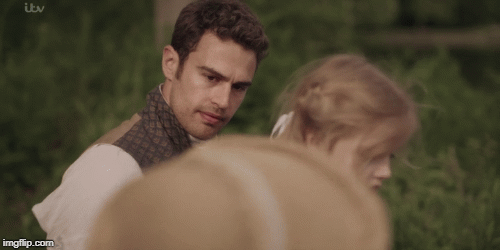
Fortunatelylori: Awwww! This is Sidney essentially seeing his unborn children in Charlotte’s eyes. (that is the most romantic lyric in the English language and no one will convince me otherwise)
However, what ends up happening? Sidney lowers his guard just in time for Charlotte to reactivate her suspicions which leads to their most explosive fight to date:
Episode 4
Sidney: Did we not agree that you would look out for Georgiana? Keep her out of trouble? I should have known you weren’t to be trusted.
Charlotte: And I should have known, despite your professed concern, you care nothing for her happiness.
Sidney: I would ask you to refrain from making judgments about a situation you don’t understand.
Charlotte: I understand perfectly well!
Sidney: Of course you do! Even though you’ve known Georgiana but a handful of weeks and him but a matter of hours.
Charlotte: That was time enough to learn that Mr. Molyneux is as respectable a gentleman as I have ever had cause to meet.
Sidney: You seem to find it impossible to distinguish between the truth and your own opinion!
Charlotte: The truth? You wish to speak of the truth, Mr. Parker? The truth is you are so blinded by prejudice that you would judge a man by the color of his skin alone.
Sidney: You speak out of turn.
Charlotte: Why should I expect any better from a man whose fortune is so tainted with the stain of slavery!
Sidney: That is enough! … I do not need to justify myself to you.
They essentially spiral out of control in this scene. Sidney’s trust issues come back and his lack of feed-back to Charlotte’s accusations make her provide increasingly horrible explanations to fill in the blanks.
Because their fights tend to be very intense (they are both people with very strong personalities), it’s easy to think of the two of them as simply not being compatible.
But their issues aren’t a matter of compatibility but rather an inability to find the right channels on which to communicate with each other, despite both wanting to.
Which brings us to episode 5
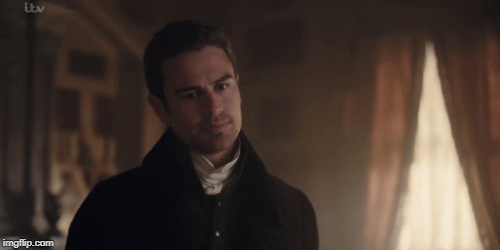
I love these little acting choices Theo James makes. This sigh is so evocative because it’s pretty clear it’s not frustration or boredom, but rather Sidney still reeling from her accusations in episode 4.

On the other side, Charlotte looks at him and thinks he is distant and non-affected and because, despite being angry, she still wants to connect with him, she tries so hard to use Sidney’s acerbic wit against him and keeps attempting to poke the big grizzly bear:
Charlotte: I assume you are here for the cricket.
Sidney: Never short of assumptions, Miss Heywood.
Unable to find a chink in his cold shoulder, Charlotte tries again at the cricket match:
Charlotte: Good luck to you too, Mr. Parker. Although I imagine you don’t think you’ll need it.
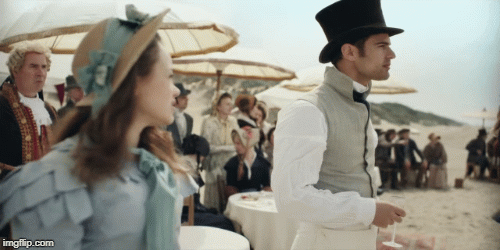
Sidney: Yes more assumptions, Miss Heywood?
Sidney is so pissed at her in this episode, not even her low key flirting with James Stringer galvanizes him.
But then something quite unexpected happens … Without actually realizing it, Charlotte manages to find the right channel to communicate on:
Stringer: You haven’t got another player to replace him. We win.
Charlotte: I’ll play.
With the wide eyed enthusiasm of a true romantic, Charlotte taps into the core of what Sidney desperately needs in his life. She doesn’t just help and support him when he needs her to but crucially she doesn’t put a price tag on it.
Charlotte: Is that a smile I detected?
Sidney: Oh, I doubt it …
Charlotte doesn’t enter the cricket match because she wants to use that gesture to ask Sidney for money for her pyramid scheme or gaslight him into thinking her betrayal was actually her “waiting” for him. Charlotte does it because she wants to see him smile. And just look at him …
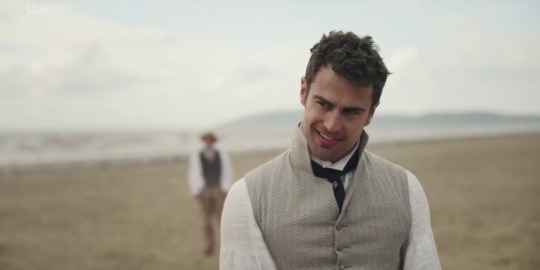
Unfortunately that momentary progress is derailed again when Georgiana is kidnapped which will eventually lead to the carriage scene in episode 6 where Charlotte’s need for feed-back clashes with Sidney’s trust issues in their most revealing conversation.
It’s tempting to look at this argument and think Sidney is the only one who is in the wrong and who needs to change. But that would be missing a few important aspects of the story.
Charlotte: Otis never meant to place Georgiana in harm’s way. Any more than I did.
Sidney: And yet you both did.
I think a lot of people, Charlotte included, fall into the trap of believing that if someone didn’t intend to harm someone else that means they haven’t actually done something wrong. Which is why there are still people in the Sanditon tag that are resisting the idea that Tom Parker is a villain. Surely he never meant to hurt his brother and he didn’t force him to propose to Eliza, so why is everyone so hard on him?
But like Charlotte had to learn with Otis, just because Tom didn’t intend to cause Sidney harm doesn’t change the fact that he very much did.
In this case, Charlotte’s major mistake was not that she helped Georgiana stay in touch with Otis. Charlotte’s mistake was in assuming she had the whole 1000 piece puzzle completed when she only had about 200 pieces in place.
Charlotte: All I ever cared about was Georgiana’s happiness.
Sidney: What did you think I cared about?
Charlotte: That is anyone’s guess!
Sidney: I’ve done the best I can by Georgiana.
Charlotte: No! At every turn you have abdicated responsibility. If you truly cared for her welfare, you would have watched over her yourself.
Sidney: It is a role I neither sought or asked for.
Charlotte: Of course not! Because you are determined to remain an outlier. God forbid you give something of yourself!
Sidney: Please do not presume to know my mind, Miss Heywood.
Charlotte: How could anyone know your mind? You take pains to be unknowable. All I know is that you cannot bear the idea of two people being in love.
Despite admitting she doesn’t know his mind, Charlotte can’t help herself from filling in the blanks with what she assumes is a conscious desire to be uncaring. Because she doesn’t have the life experience to come up with another answer.
For his part, Sidney is hurt by her lack of trust in him but unwilling to trust her enough in return to tell her the whole story. Still her words do affect him enough to make him begin to lower his barrier and give Theo James one of his best acting moments:
Sidney: And what do you know of love? Apart from what you’ve read?
Charlotte: I would sooner be naïve than insensible of feeling.
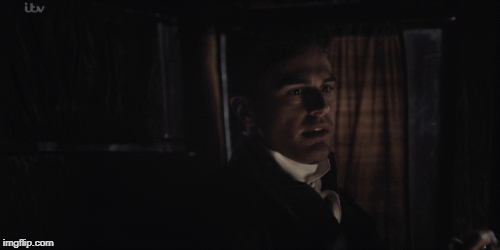
Sidney: Is that really what you think of me? I’m sorry that you think that. How much easier my life would have been if I were …
Fortunatelylori: I just … he’s very good … that is all
It would be very tempting to assume that since Charlotte admits to being naïve once the whole Otis and Georgiana’s situation is revealed:
Charlotte: It’s all so overwhelming! I hardly know what to think anymore. (beat) About anything! I’ve always felt so certain of my judgment. But now I see that I have been blinded by sentiment and naivety. How could I have gotten it all so wrong? No wonder your brother has such a poor opinion of me …
and Sidney begins to show more outward concern for the people around him and validate Charlotte in ever increasingly romantic ways:
Charlotte: I know … I’m too headstrong. I’m too opinionated. I’m too …
Sidney: No. You are not too anything. Don’t doubt yourself. You’re more than equal to any woman here.
That their clashing world views are now aligned. But the truth is, Sidney isn’t the one to explain to Charlotte how it was that he became “insensible of feeling”. It’s Tom that tells her that story (and then promptly bungles whatever help he might have provided his brother). Sidney’s trust issues remain which is evident even as late as episode 8:
Babbington: I believe she’s tamed me.
Sidney: Yes … I just imagine how that might feel.
And
Sidney: I have never wanted to put myself in someone else’s power before.
Don’t get me wrong, I melt every time I hear that second line but it is indicative of the fact that love still feels like an inherently risky and dangerous thing for Sidney where he is obliged to hand over his power to someone else and pray that person doesn’t abuse it the way Eliza did.
For Charlotte’s part, Sidney beginning to reveal more of himself and show her the true man underneath the armor, makes her fall more and more in love with him. And the more she loves him, the more afraid she is of outwardly showing it. His confusion over his feelings for her and Eliza’s reappearance in his life, cause her to attempt to fill in the blanks again in episode 7. First by proxy, while talking to James Stringer:
Charlotte: You are far too sensible to form such a misguided and futile attachment.
Stringer: Why should it be futile, Miss Heywood? For all you know your feelings are repaid 5 times over.
Charlotte: I allowed myself to believe so for the briefest of moments. But I cannot deny the evidence of my own eyes.
And then directly:
Sidney: I hope you weren’t too offended by Mrs. Campion. It was only meant in jest.
Charlotte: Is that all I am to you? A source of amusement?
Sidney: No. Of course not! You’re … Forgive me.
Charlotte: On the contrary, you’ve done me a great service. I am no longer in any doubt as to how you regard me.
So what happens in episode 8? Well, they essentially trade places, going from this:
Charlotte: I hope you won’t think too badly of me.
Sidney: Think too badly of you? I don’t think of you at all, Miss Heywood.
To this:
Sidney: Tell me you don’t think too badly of me.
Charlotte: I don’t think badly of you.
In one of my metas I made the point that Sidney Parker IS Charlotte Heywood’s coming of age story: he is her first love, the first man she is sexually attracted to, her first kiss and well … unfortunately also her first (and hopefully only) heartbreak.
By being forced to deal with her own sense of loss and the pain of being separated from the person she loves, Charlotte will finally be able to understand the true nature of Sidney’s insensitivity of feeling. Instead of causing her suspicion or apprehension, she will be able to connect with it because she’s lived through it herself.
As for Sidney … I don’t think it’s a coincidence that in the end he is forced to do to Charlotte what Eliza did to him all those years ago. He chooses to marry a wealthy woman he does not love and disappoint a poor woman whom he does love.
I think given that his motives are obviously altruistic while Eliza’s were not (both per Tom’s story as well as her general character as revealed in the show so far), the point of the similarity is not to bring him closer to Eliza. Certainly not when he’s looking at Charlotte like this:

Which means that him being forced to contend with what happened 10 years ago by reliving the incident, this time in the role of the aggressor, is there to increase his level of vulnerability and put him in the place of the earnest person trying to reach out for emotional connection and having to fight to pull down the walls he himself helped put up in Charlotte.
You know what they say … If you really want to know someone, walk a mile in their shoes. No one ever said those shoes would be comfortable.
#sanditon#sanditon meta#sidlotte#sidlotte meta#jane austen adaptations#sidney parker#charlotte heywood#sense and sensibility#sanditonmetacollab
122 notes
·
View notes
Text
Pagan Poetry
Written for FS 464: Film as a Visual Poem, on September 18, 2017
Bjork is, like many poetic artists, misunderstood by a lot of people. However, there is a reason she has won awards and gotten media attention, other than her swan dress. She pours herself out into every song, and whether you understand what she is saying or not, you can feel the raw emotion behind it. Both the song and video for Pagan Poetry explore the dialog between love, pain, and lust. Bjork is telling us about her love for someone and the pleasure he gives her along with the pain attached to him. This pain is both wanted and unwanted, almost necessary for the relationship. The abstract images slowly become more clear, revealing different parts of Bjork herself. She is showing herself and becoming more comfortable, realizing what she wants before our eyes, being reborn in a sense. Love is considered sacred in most cultures. It is supposed to be the closest thing to a magical experience that you can have. The worst people can change for love, the true happiness makes them want to be better or opens their eyes to a new point of view. Love can also blind you from the bad things about your partner or the world itself. The shelter of love can both be constructive and destructive.
We witness the piercing of her nipples on screen. Body mutilation is shown as a way of expression and self-love as it is for many people. Many cultures even use it as a sign of honor or bravery. Whereas in many western cultures, tattoos, piercings, and scarification are seen as the sign of someone who hates themselves and others. It is seen as unprofessional and unfriendly, though it is slowly becoming more accepted. But it is also to resemble to piercing pain that love can be related to. The draping of pearls and lacing of the piercings on her back match the weaving of the messages and emotions of love and agony throughout the song. Her vocals are precise but have an animalistic quality, adding to the true emotion of the piece. The love and pain for her is instinctual human nature, but it has such a taboo around it, she must question if it is what is best for her. When her face is fully shown, she is smiling while singing, as though she is in ecstasy. However, as the song goes into a chant of “I love him” she stops singing on screen and seems to be in distress. This chant gives the song and video a sense of ritual, love and pain dialog ritually. One must always sacrifice something for love.
Many marriages end in divorce. I have always wanted to believe that love existed in the beginning or at least somewhere down the line. People are breaking the taboo that you must love one person forever. Love cannot exist without pain. She is wearing a dress by Alexander McQueen, a famous fashion designer, another artist. The dress exposes most of her torso with a mermaid bottom creating an incomplete wedding dress aesthetic. There are pearls, often seen as a feminine accessory, draped from her neck and shoulders. She is breaking taboos and bringing up stereotypes addressed to being a proper woman while she herself is embracing pain with love. She is opening exposing herself and the love and pain coupled with ecstasy and lust. The lyrics also suggest that perhaps there was an openness to the relationship at some point, or perhaps in her last relationship. This brings up the possibility that it started as something solely sexual and for her it developed into other feelings. It is often said that one of the most painful things in life is losing a lover or partner. She yells and shouts with a smile on her face that he makes her want to hurt herself. Shortly after we see an image of corset piercings on her back and blood around the holes. The weaving of these emotions is making her bleed and yet she will not let go of them because they also provide her with a sense of liberation from the bonds of social norms in relationships and as a woman.
People are highly affected by the emotions tied to poetry and music. Our lives are surrounded constantly by music and its effects. Some people argue that particular music can affect us negatively, while others claim that all music has a sense of liberation for individuals. According to legends, Orpheus was the first poet. He is usually depicted holding a musical instrument known as a lyre. In many images, the lyre is being held to his chest and close to his heart. It captures the soul of the poet, his love, his emotions, and all that he is. Music and poetry are to this day seen as way to ultimately expose yourself emotionally and express everything that you are and hope to be. Two important words that have risen from the lyre are lyrics and lyrical. These words are used to describe art from all genres, including music, painting, poetry, and film. All essential to an artist’s everyday life. Lyrics are words, often associated with poetry that are connected to a melody and are meant to be sung, not just spoken, however, there is a thin line that is often crossed between speaking and singing. Poetry itself is very musical. It is aware of rhythm, tones, and patterns. Chants and repetition can be seen in both music as well as poetry. The chorus of many modern songs is extremely repetitive and can evoke the feeling of a chant, especially when we look at genres like rap and hip hop. Rap is a genre that frequently crosses the line between singing and rapping and focuses highly on rhythm and rhyme just as poetry does, whereas other genres may focus more on the melody and the music.
As stated before, there is a thin line between music and poetry and they are often weaved together. They both deliver and story in a very strong, emotional, and intimate way. The artist is aware of all of the elements that go into his piece and strives to capture the essence of being human. This also applies to film, a visual poem. However, it is not a visual poem the same way that a painting is, it has literal movement and stillness contrasting each other. Film is a massive mixing pot of many different art forms. Greek tradition calls the poet and lyrical being, lyricism being strongly attached to passion. Plato had said that poets are enthusiasts. They are expressive, passionate and energized by that passion. To Plato, enthusiasm is a trance. Poets become enraptured by their subjects, they dig deeper and deeper into something and they cannot be pulled out of their art and passions. In The Republic, he says that poets should not be included in the city. They are radicals or have a tendency to embrace radical behavior and thoughts, and this is a danger to society. Poets abandon logic and twist language, they play with concepts like young children poking at dead animal carcasses. They explore depths of opinions and subjects that are taboo and to most people should not be thought about. Tarkovski’s poets illustrate two sides of this. His mad poet is loud and filled with rage. He is disruptive and subjects everyone in his presence to his truth, he scars them with the images of his death and the sounds of his final cried. The wise poet, however, uses silence to contemplate his message. It slowly sinks deep and has a chilling tone about it. He is caught in a silent trance while performing his final ritual.
In a sense, poets create their own language. Shakespeare is one example of a poet literally creating language. He betrayed the known laws of language and created terms and phrases that are still common in language long after his death. His impact on society and art is immeasurable. His plays have been rewritten and stories retold over and over. His plays often put people in the shoes of the poet, entrancing them and inviting them to think about the taboo and unusual. Topics of spirituality and sexuality are often covered in Shakespearean plays and poetry. Lyricism and poetry can represent the elevation of the voice and the gaze from the creation of language. As long as that language is lived through momentum and constantly fed with the energy of the poet and the audience.
Poetry embraces the duality of chaos and order. Many poems have a strict formatting while also exploring the chaos of humankind within its text. Poets whether through literature or image are obsessed with paradoxes and irony. There is a constant idea of the overlap between two things usually seen as opposites. Black and white are colors used frequently as a metaphor even when the concepts presented in the piece explore the many different shades of grey. Modern art often depicts Orpheus as a meaningful hero. He is seen as a representation of the human experience and what it means to be an individual. He is to thank for the many different forms of art and poetry that our lives come into contact with. We have access to so many different ways of expressing ourselves and sending a message to other people. We can connect and embrace other people and individual personalities through poetry while exploring areas of our subconscious we are not always familiar with. Raoul Dufy shows Orpheus surrounded by the sea and nature. In the image, there is a balance between the sky and the ocean. The presence of nature is a representation of how natural poetry is and poet’s deep connection with nature and life. Orpheus is at the center of the world and able to communicate across many platforms and elements. He can dialog with life and the spirit of nature. This lines up with the legend that his power of words and lyricism, he was able to communicate with the entire world, from the biggest creatures, to the smallest, down to small specks of life hardly seen or noticed by humankind. It is said that he could even make stones cry. This legend applies the idea of super natural power to poets.
As creators, artists across all genres adapt a special style so they can be seen as an individual and separate themselves from the works of other famous creators. They often have another artist that helped them discover their art, style, and passion. Visual poets are true visionaries, their gaze being projected with and onto others and sending out sparks of inspiration to other aspiring artists that wish to show the world their point of view. Orpheus’ vision and gaze was so powerful, that he could be seen as an extremely unsettling force. He could dialog with the Gods. I can understand why Plato would want to kick out poets if they could speak to the Gods. Poetry and visual poems explore spirituality and occasionally the spirit world itself. It is often referenced or its image depicted within poetry or films. Poets have a particular charm to them, making them dangerous because this charm gives them the power to speak with many different forms of life and even gives them a sort of power over others. Other people can be put into a trance with the chant of a poet. They can become mesmerized and led away from the dangerous safety of societal norms.
Art is a journey. Film, music, and poetry all take us on an adventure when they attempt to capture the Orphic voice. Their rhythm and voice often embracing a sense of ritual. Similar to how many parts of Bjork’s video do. The act of piercing is a ritual of adulthood and life events in many cultures. Even within modern western culture there is an accepted way to perform the act of piercing one’s body. In Pagan Poetry, she undergoes a journey of self-discovery through love and pain, just as is the poets goal to go on an extreme journey. However, extreme can mean even the smallest things. Because poets look at the world through the grey and in between areas, they do not always see the black and white as the most extreme. So many people accept that life if black and white that it is more extreme to walk somewhere in the middle. Though poets and filmmakers often explore the unknown and unreal, they also have to acknowledge reality. You cannot explore the unknown without first knowing what is known and accepted amongst the masses. Music videos bring poetry, music, and filmmaking together as a holy and transgressive experience. Artists like Bjork explore parts of reality and the subconscious seen as taboo through these art forms. She, as well as the filmmaker, want the viewer to also explore everything from the visuals, to the music, to the lyricism and words. Pagan Poetry explores the Orphic voice with its playful journey through sexuality, risk, love, and pain as one.
#film#film student#music video#pagan poetry#bjork#student#student paper#student writing#writing#paper#analysis#art
6 notes
·
View notes
Text
Screenplay to Novel: 5 Steps to Novelizing a Script
Script’s Editor Jeanne Veillette Bowerman challenges screenwriters to take on the NaNoWriMo challenge by adapting backwards, screenplay to novel.
Click to tweet this article to your friends and followers!
As many novelists know, November 1st marks the launch of National Novel Writing Month, a personal challenge to write a 50,000-word novel in 30 days. But what about a screenplay? Is there any value in turning a screenplay into a novel?
Absolutely. No writer should ever box themselves into one medium. Storytelling is changing, even for screenwriters. Sure, we dream of seeing our scripts come to life on the big screen, but that is not an easy task. It’s not impossible, but it could take millions of dollars and a champion advocate to make that kind of dream come true.
However, you don’t need to let your story rot on your hard drive. Let that baby free and adapt it into a novel yourself. Hollywood loves intellectual property. Just look at the latest movies and TV shows. Most are adapted from books or short stories. It’s time to shift your game plan and double your odds of success.
That goes for novelists, too. You should be considering the potential of adapting your novels and short stories into features and TV pilots, or the very least, think about structuring your stories to attract Hollywood producers. But I’ll address bringing you all over to the dark side when Script officially moves to Writer’s Digest site by year’s end. (Yes, we’re joining forces to bring all storytellers and resources together on one site!)
Do I hear adaptation skeptics out there? Well, zip those negative lips. Professional screenwriters are even doing it. Yes, many pro screenwriters are also writing novels: Daniel Pyne, Doug Richardson, John August, the Thornton Brothers, Joe Gazzam, my own writing partner, who is a ghost writer for Hollywood, Unknown Screenwriter, plus many more. While they write screenplays for studios and production companies, they are taking the leap into prose, some to ultimately adapt into TV series or features. By putting their stories on the bookshelves now, they get the satisfaction of sharing their art while growing their fanbase.
Writers write to emotionally move people, but you can’t move anyone if no one is reading your stories. NaNoWriMo is the perfect opportunity to give novel writing a shot since your script serves as a fantastic outline.
If you’re still looking crosseyed at my suggestion, please stop and take a deep breath. Open your mind and see the change in the industry before it smacks you aside the head. You already have everything you need. You just need to put your big-girl panties on and dive into the challenge.
Change is scary, but allow me to suggest something even scarier: No one ever discovers your screenplay or your talent as a writer. Read that again. That’s a terrifying thought. I’m sure you’ve had friends ask, “Have you written anything I’ve seen?” Then they scoff because you haven’t. Does that mean you aren’t a real writer? Now imagine your friends ask you about your scripts, and you can hand them a book adapted from one. Physical proof of your talent. Imagine how that would feel.
You can do this.
As a screenwriter, you’re trained to write cinematically and to make stories a “fast read.” That’s what we do. We pull the studio reader in immediately and make then have to keep turning the page. Trust me. That skillset translates into great novel writing. Not to mention, with society’s attention span being that of a gnat, an increasing number of readers want novellas and stories they can read in one sitting. The trends are always shifting, and it’s important you, as a writer, try all angles you can to stay ahead of them.
Another benefit is when you dive deeper into your story, you might find new characters, new sub plots, and new perspectives you can then take back to your original screenplay in its next rewrite. Whenever I have explored new scenes, even if just for the heck of it, those shifts taken off the “main path” have always led to a richer writing experience.
But before you start writing, be sure the story works as a novel. Not every screenplay makes an excellent book. You want a story where you can crawl in the characters’ heads and a reader can sink into for longer than the two hours it takes to watch a movie.
30 Tips for Writing a Book in 30 Days
If you don’t have a script that would work as a novel, then use these 30 days to get a first draft of a new screenplay done. Challenge yourself to write every day. After all, it takes 28 days to develop a habit. After the 30-day challenge is over, you’ll have a new routine that promises to get more scripts written in the coming year.
Anyone who reads my Script column regularly knows I’m no wimp when it comes to a challenge. Just the mere thought of one makes my skin tingle with delight. I’m a competitive freak when I need to be, even more so when the person I’m challenging is myself.
Instead of telling you all about the values of doing NaNo, including simply getting in the practice of writing every day, you can read a piece I wrote, sharing the 10 lessons I learned from NaNoWriMo.
How do I turn my screenplay into a novel?
I polled some of my professional screenwriter friends who have done just that. Here are their top five tips:
1. The hard part is done. You already have a story with structure and characters. That’s one hell of a detailed outline for a novel. Copy and paste that puppy into a Word file or Scrivener.
2. Decide on a Point of View. As screenwriters, we always write in the third person, but if you’re writing a novel, you can decide whose point of view you want to tell it in… the antagonist, the protagonist, the third person or the first person. You can even use a different character’s point of view for each chapter. Your story could be more interesting told from a specific character’s perspective.
6 Tips for Choosing the Right Point of View
3. Start with a skeleton. Take your script and transform it into the prose of a novel, one scene at a time. Don’t worry about descriptive prose or getting into the characters’ heads yet. Just put the basic story down into novel form. The average novel has an 80,000 word count (but can be more or less, depending on the genre). Once you get the skeleton of your story down, you’ll have a better idea of how far off you are from the mark.
4. Beef it up. Now is the time for fun! The benefit we have as screenwriters is our natural ability to write visually. Take off your screenwriting shackles and let loose with the flowery prose and start crawling inside your characters’ heads, telling their thoughts and feelings… things we can never do as screenwriters! At first, it won’t seem natural, but in time, I promise, you’ll start enjoying the freedom to explore your story mentally rather than visually.
5. Fill in the holes. Screenwriters are trained to write lean and mean. Go back and find those scene darlings you had to cut in order to get your script to the 110-page sweet spot. Oh yeah, you can add those suckers back in! You can even add other subplots and characters; though I’d still be sure any subplot you add relates to the theme of your story.
Now, I’m not suggesting you write the next War and Peace. Quite the opposite. A lot of successful, self-published ebooks are written efficiently in order to make the books a quick read. The readers of today often want to read a book in one sitting, and if they like the author, they want their next book to be out in a month or two. As a screenwriter, you’re the perfect writer to take advantage of that market. Grab that pile of spec scripts and start adapting!
Bottom-line: It’s hard to get a script produced, especially since the 2008 market crash. But as a novelist, you can get your work in the public eye, even by self-publishing, and possibly get interest in your script from the exposure. Again, Hollywood produces tons of book adaptations every year. Why not yours?
You really have nothing to lose. In fact, you might even discover you’re good at being a novelist and branch out into a new form of writing. Now, do you see why Script and Writer’s Digest are merging? We’re planning on world domination of all things writing, so get ready for the ride!
As I always say, writers write. My new career plan is to write both novels and scripts. I want to move people with my words, and I can’t do that if they’re sitting on my hard drive waiting to get produced.
How to Write While Managing a Full-Time Job
But how can I find the time to “win” this challenge?
The disclaimer: Most of us work full-time jobs, and it’s hard to imagine how we’ll find the time to write 50,000 words in 30 days (it breaks down to 1,667 words per day). My plan is to simply write something… anything… every single day. Even if at the end of the 30 days I only have 20,000 words, that’s 20,000 more than I have today. I’d rather have 20,000 quality words than 50,000 crappy ones. I’ve done that, too. Even that had its benefits. To hit the 1,667 word count a day, I let my characters run wild in my mind and did stream-of-consciousness writing. They took me places I never imagined, which are now part of a new outline of that novel.
I love the pressure of a deadline and ticking clock. In my post about the lessons I learned in NaNoWriMo, I describe a word-churning program called Write or Die. You enter the desired word count for that writing session, as well as the time you want to write it in. While you’re writing, the program will start honking at you if you slow down. It’s a fun way to keep the pressure on!
Consider joining me in the challenge and find me on the NaNoWriMo site, username jeannevb, Add me as a buddy. We can keep track of each other’s progress, send messages of encouragement, and build a whole new community of writers to support our efforts. I made amazing friends when I took the challenge in 2011 and 2013, and I know I will only widen that circle this year.
Put your NaNoWriMo usernames in the comments below to connect with each other!
Find more great Writer’s Digest articles on navigating National Novel Writing Month!
Need help crafting a novel? Save hundreds on our bundle of products to help:
30 Days to a Finished Novel Kit
BUY NOW!
The post Screenplay to Novel: 5 Steps to Novelizing a Script appeared first on WritersDigest.com.
from Writing Editor Blogs – WritersDigest.com http://www.writersdigest.com/writing-articles/by-writing-genre/script-writing/screenplay-to-novel-5-steps-to-novelizing-script
0 notes